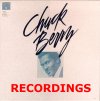Sunday, March 18. 2012
After 50 years - is Chuck Berry material now free to copy?
Comments
Add Comment
Main Page
This weblog is an addition to my Chuck Berry fansite called "A Collector's Guide to the Music of Chuck Berry" which describes all books and records of interest to everyone enjoying Chuck Berry's music.
Categories
What You Missed
Some earlier but important entries:
- Unanswered questions about the recording of Memphis, Tennessee
- Sweet Little Eight Variants of Sweet Little Sixteen
- The Johnny B. Goode Session
- Chuck Berry in Stereo
- Chuck Berry's Recording Session for Volkswagen
- Chuck Berry's Recording Session for Dr Pepper
- Tim McFarlin Introduces the Berry-Johnson Test into American Copyright Law
- Chuck Berry's Early Recording Locations
- Run! Rudolph, the Red-Nosed Reindeer – and the copyright mystery
- Chuck Berry live in New York 1956
- The very first Chuck Berry LP album
- The Chuck Berry On Stage (Chess LP-1480) confusion continues
- The Chuck Berry Vinyl Bootlegs, Vol. 1: Rare Berries
- Rocksmuk album - bootleg or not?
- 6034 cover versions of Chuck Berry songs
- Chuck Berry's Greatest Hits (Chess LP-1485) variants
Recent Entries
- The very first Chuck Berry LP album
- Tuesday, September 2 2025
- CBID - Chuck Berry covers online, live, and on record
- Monday, July 28 2025
- CBID - Maybellene versions and other covers
- Wednesday, April 23 2025
- CBID - More Berry Covers and other things…
- Saturday, March 15 2025
- CHUCK100 Tribute EP Series
- Thursday, January 16 2025
- CBID - Corrections, Additions, New Covers
- Friday, January 10 2025
- Rhythm and Rhyme - Chuck Berry’s poetic heartbeat
- Sunday, December 22 2024
- CBID - 6034 and counting ...
- Friday, November 1 2024
- CBID - 6034 cover versions of Chuck Berry songs
- Friday, July 5 2024
- CBID - The Never Ending Story - pt. 9
- Monday, June 10 2024
- CBID - The Never Ending Story - pt. 8
- Tuesday, June 4 2024
- CBID - The Never Ending Story - pt. 7
- Monday, April 22 2024
- Peter O’Neil’s So-Called Disorder
- Friday, April 12 2024
- The Chuck Berry Sound according to Atomicat
- Wednesday, April 10 2024
- CBID - The Never Ending Story - pt. 6
- Wednesday, April 3 2024
- CBID - The Never Ending Story - pt. 5
- Saturday, March 16 2024
- CBID - The Never Ending Story - pt. 4
- Monday, February 19 2024
- CBID - The Never Ending Story - pt. 3
- Monday, February 5 2024
- CBID - The Never Ending Story - pt. 2
- Monday, January 22 2024
- The Chuck Berry Vinyl Bootlegs, Vol. 3: America's Hottest Wax
- Tuesday, January 16 2024
- Chuck Berry in Fake Stereo
- Friday, January 12 2024
- CBID - The Never Ending Story
- Thursday, January 11 2024
- CBID - 5639 cover versions of Chuck Berry songs
- Tuesday, October 31 2023
- CBID - Covers, Chart Listings, and Not-Covers
- Monday, August 28 2023
- CBID - And they play Chuck Berry music - final part 10
- Monday, March 27 2023
Search
Copyright and Disclaimer
The complete contents of this weblog is
© Dietmar Rudolph
No part of this document may be used or published without written consent by the author.
Impressum/Haftungsausschluss/Datenschutz/Disclaimer
To contact the authors, email to cbguide@crlf.de.
© Dietmar Rudolph
No part of this document may be used or published without written consent by the author.
Impressum/Haftungsausschluss/Datenschutz/Disclaimer
To contact the authors, email to cbguide@crlf.de.
